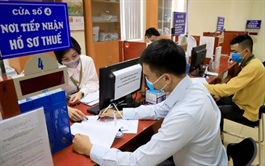State Bank to regulate foreign unsecured loans
State Bank to regulate foreign unsecured loans
A recent trend of borrowing foreign unsecured loans for businesses and investment activities of securities companies has become quite popular as it allows cheap capital to flow freely. This has also become an important capital source which is contributing to more growth of liquidity in the domestic stock market.
Illustrative photo. |
The State Bank of Vietnam (SBV) is now preparing a draft to replace Circular 12/2014/TT-NHNN which will then place conditions on foreign loans for enterprises that are not guaranteed by the Government. This move by SBV has created great anxiety among investors because it will affect the cash flow into the stock market and even cause the market to decline.
Capital from abroad
The VN Index has recently seen a sharp drop of more than 24% in the month of April, showing Vietnam as the world's largest stock market decline. The reason for this decline is not only due to the negative influence of the world financial market but also from the drastic actions of the state management agencies in regulating the bonds market and handling of stock market manipulation.
However, the main reason that many securities experts believe is due to the phenomenon of ‘call margin’ from securities companies taking place on a large scale. This occurred when the total balance of margin loans reached a record level of VND 201,176 bn during the first quarter of the year.
Before this, the boom of the stock market during the Covid-19 pandemic helped securities companies promote margin lending support services. At the same time, besides taking advantage of equity, securities companies also borrowed capital from credit institutions (CIs) to meet the capital needs of the market. Many securities companies have taken advantage and mobilized huge capital from unsecured loans of foreign credit institutions to supplement capital for business activities.
More recently, on 12 May, Viet Capital Securities Joint Stock Company (VCSC) issued a press release on the successful signing of a loan contract with a limit of USD 100 mn, which is equivalent to VND 2,300 bn, with Megabank. Previously, VCSC had also successfully arranged two other unsecured syndicated loans in November 2021 for USD 100 mn, and in May 2020 for USD 40 mn.
At the end of March, Saigon Securities Corporation (SSI) also announced that it had completed the disbursement of an unsecured loan contract of USD 148 mn with a term of twelve months, and the reference interest rate was the Secured Overnight Financing Rate (SOFR). This is the largest foreign unsecured loan contract that a Vietnamese securities company has approached so far.
In 2021, SSI also had access to the largest source of unsecured foreign credit among securities companies, amounting to USD 267.5 mn. Similar to VCSC and SSI, Ho Chi Minh City Securities Corporation (HSC) also signed an unsecured loan syndication contract worth USD 104 mn, equivalent to VND 2,374 bn, in December 2021. Earlier, HSC had already signed two loans worth USD 50 mn and USD 44 mn.
Cheap capital flow
Foreign unsecured loans by the above Vietnamese securities companies have been carried out in the last two years, and according to a survey, most of these loans have come from Taiwanese banks. Although most foreign debt activities take place according to regulations, too much cheap capital flow can easily create bubbles in the stock market and the real estate businesses within a country.
The risk of exchange rate fluctuation can also cause pressure on the State Bank of Vietnam. Therefore, it is necessary for the SBV to amend and supplement conditions on foreign loans to ensure that borrowers can manage risks by themselves and take responsibility for arising risks as well. At the same time, it also helps the State Bank of Vietnam to improve efficiency in market management and administration.
For securities that belong to a group of borrowers who are not credited institutions, in addition to the general criteria for borrowing foreign debt, the SBV has also added several conditions to orient the loan flow. In Article 15 of the draft revised circular, borrowers are not allowed to use short-term foreign loans, such as for terms less than one year, to pay for loans arising with residents, or for debts arising from trading securities, purchase of contributed capital, and shares of other enterprises.
According to this regulation, securities companies will not be allowed to use short-term foreign loans to structure short-term domestic debt or participate in securities trading and investment, this will limit short-term speculation in the securities sector.
Article 15 of the revised Circular allows the borrower to use medium and long-term foreign loans, with a term of more than one year, to restructure foreign loans and increase the scale of capital for legal production and business according to the scope of licensed businesses. Hence, if a securities company uses medium and long-term foreign loans, it will not be limited in the use of capital for business purposes. This means that they are completely entitled to use their capital to lend to customers through margin trading services, advance money for sale, or buy proprietary securities in accordance with the law.
Through this additional regulation, the purpose of the State Bank of Vietnam is to adjust the term of foreign loan flow from short-term to medium-term, and especially not allow short-term foreign loans to flow into highly speculative channels such as securities and real estate. Securities companies can still actively seek cheap loans from abroad with a term of more than one year to serve their business activities, which is not restricted by the amended Circular 12. In addition, the regulation limits foreign loans not exceeding three times of equity or charter capital is also a positive way to control foreign loan capital flow of enterprises.

























